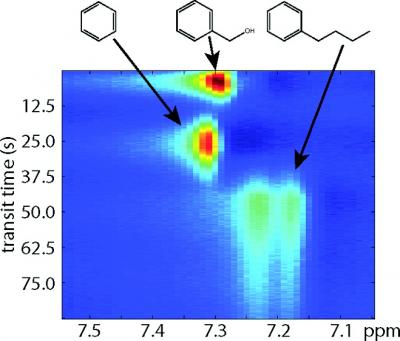Researchers at Lawrence Berkeley National Laboratory, U.S. Department of Energy (DOE) have introduced a compact system, by pairing a remote-detecting nuclear magnetic resonance (NMR) or magnetic resonance imaging (MRI) technique with that of a special chromatography version developed particularly for microfluidic chips, to help in high sensitive multi-purpose chemical analysis.
In this study, NMR or MRI techniques, that can quickly detect the chemicals present in microfluidic lab-on-a-chip device samples, was utilized to conduct investigations in a microscale monolithic chromatograph column.
 Separation of benzyl alcohol, benzene and butylbenzene using remote NMR/MRI with a monolithic chromatography column.
Separation of benzyl alcohol, benzene and butylbenzene using remote NMR/MRI with a monolithic chromatography column.
The samples are dissolved in a liquid medium called the mobile phase. The dissolved samples are made to pass through a solid medium known as the stationary phase. From the samples, scientists can segregate the chemical constituents known as analytes and use it for detection, purification and measurement purposes. The segregation of the analytes depends on the rate of diffusion of each individual species that passes through the stationary phase.
Each chromatography column of the stationary phase used in this system was occupied with a monolithic solid polymer which has nanoscopic pores in it, while in a conventional chromatography, the stationary phase chromatography column contains porous polymer beads or any distinct medium whose chemical or physical properties alter the speed of analytes that diffuses through them.
The success of this system is due to the isolation of NMR or MRI signal detection and encoding phases. NMR or MRI signals are formed due to molecular spin which allow nuclei to behave as bar magnets with north and south poles. The NMR or MRI signal is obtained from the sample in a direction where there are more nuclei spins. Conventionally, signal identification and encoding phases are functional in the same machine, hence requiring a strong external magnetic field.
In remote-detection NMR or MRI system developed by Berkeley Lab researchers, the signal encoding and detection phases occur autonomously and allow the detection of NMR or MRI signals without the presence of any external magnet, yet providing identical sensitivity as conventional NMR or MRI.
By paring JPEG-style image compression programs, remote-detection devices, and other components, this NMR or MRI technology can magnify microscopic objects present in a sample that flows through a microfluidic chip column with excellent spacing and time resolution.